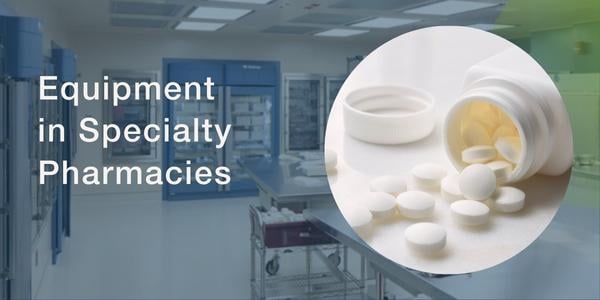Specialty pharmacy represents the largest single-focus opportunity for health systems to improve patient outcomes and experiences while still realizing incremental economic growth.
Through 2025, the specialty drug market is expected to grow by 8 percent a year, which represents a $118 billion increase during a 3-year period.
A key differentiation between traditional pharmacies and specialty pharmacies is how they are integrated into treatment planning and patient care. Because specialty drugs are used to treat patients with complex, often chronic and rare, conditions, specialty pharmacies are heavily involved in the continuum of care. Specialty pharmacists work directly with prescribing physicians and patients to provide education and support, and to administer treatment.
Accreditation requirements have been developed to set best practices guidelines for facilities that provide specialty pharmacy services. Accrediting bodies like the Accreditation Commission for Healthcare (ACHC) and the Utilization Review Accreditation Commission (URAC) are responsible for managing these requirements.
Specialty pharmacy accreditation indicates a facility maintains high and consistent standards related to specialty medication distribution and administration. It differentiates facilities and provides an infrastructure for operational competency focused on patient care, patient data management and reporting, medication handling and storage practices, and other key metrics that support positive clinical outcomes for patients throughout treatment. Accreditation also supports state and federal regulations, licensing, and other regulatory requirements.
Accreditation is often the first gatekeeper payers and specialty medication manufacturers look for when determining which facilities will have access to specialty drugs and be included in limited drug distribution (LDD) networks. LDD networks limit access to certain high-maintenance medications to a single, or in some cases a select few, specialty pharmacies. 85 percent of specialty drug manufacturers manage some, or all, of their products through LDD networks.
Increased access to specialty drugs broadens the treatment portfolio facilities can provide patients, and as a result may positively impact patient satisfaction and improve overall clinical outcomes.
Other Blogs You Might Be Interested In...
- Protect High-Cost Specialty Drugs with Medical-Grade Refrigeration
- USP <800> Refrigerator Frequently Asked Questions Answered
- Pharmacists Expected to Maintain Expanded Role in a Post-COVID World
- Interlock Pass-Thru Pharmacy Refrigerators for Your USP <797> Cleanroom
Initial accreditation and ongoing accreditation audits require extensive documentation on standard operating procedures (SOPs) in the specialty pharmacy. Initial accreditation is normally about a six-month process with post-accreditation audits ensuring ongoing compliance with accreditation standards.
While the accreditation review may be completed in several months, it may take multiple years to develop the infrastructure and SOPs required to meet accreditation standards.
Facilities seeking accreditation are required to provide documentation related to specialty drugs storage and handling practices, including temperature monitoring policies. Creating comprehensive SOPs supports risk management practices.
In specialty pharmacies, cold storage equipment should provide more than a high level of temperature performance.
Equipment should also support specialty pharmacy workflows. This can be achieved by choosing equipment that offers technology capable of providing advanced monitoring and data logging capabilities, and the ability to export that documentation for both review and audit purposes.
Specialty pharmacy equipment should also be regularly maintained and calibrated to ensure it continues to perform as intended. Up-to-date certificates of calibration provide visibility into equipment performance and maintenance and should be kept on file.
Helmer Scientific manufactures professional medical-grade cold storage equipment. Helmer’s portfolio includes a full range of equipment specifically designed to support the needs of specialty pharmacies.





